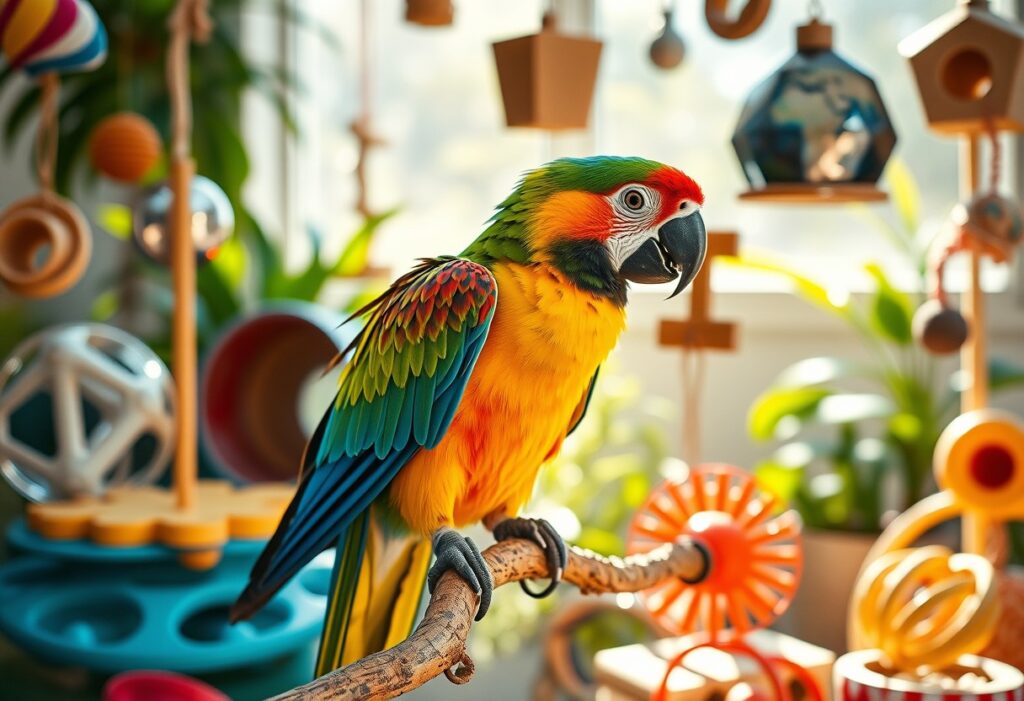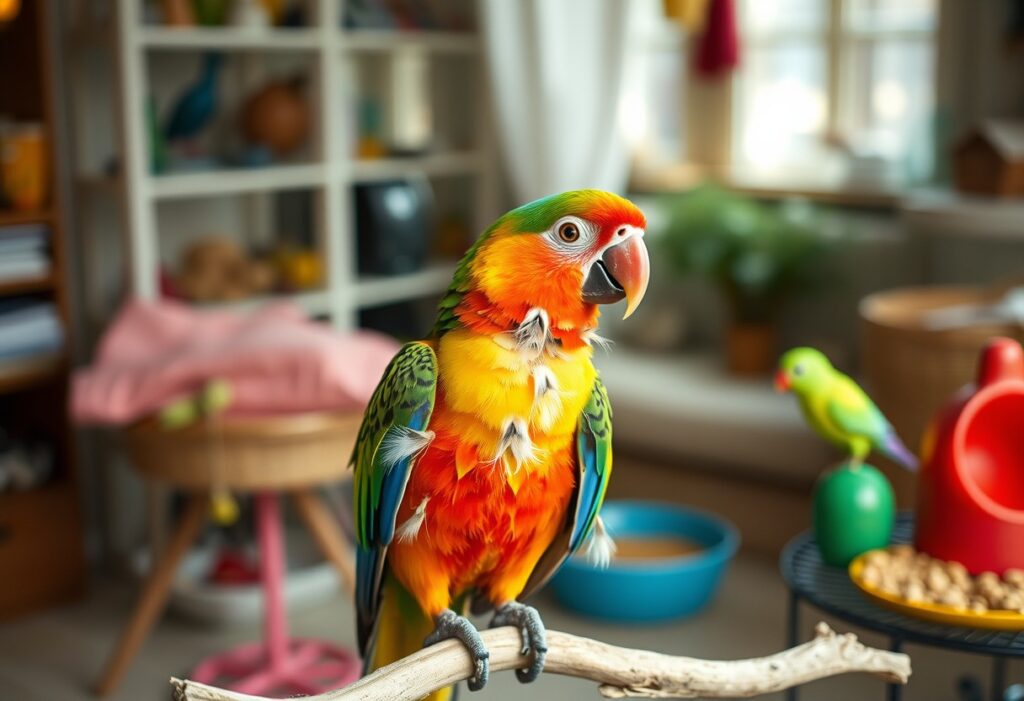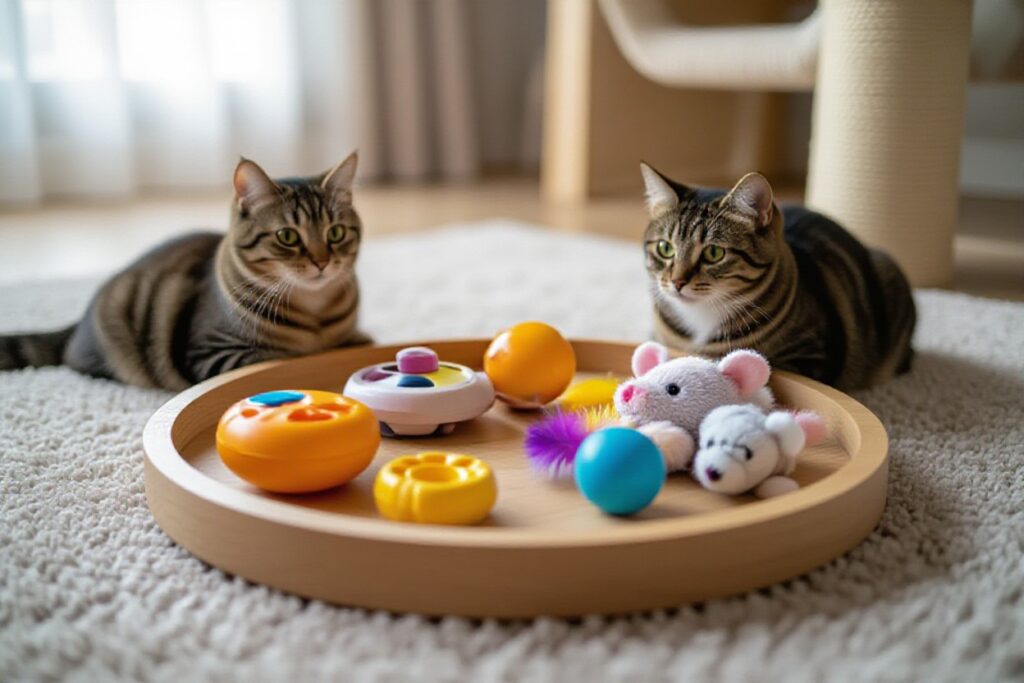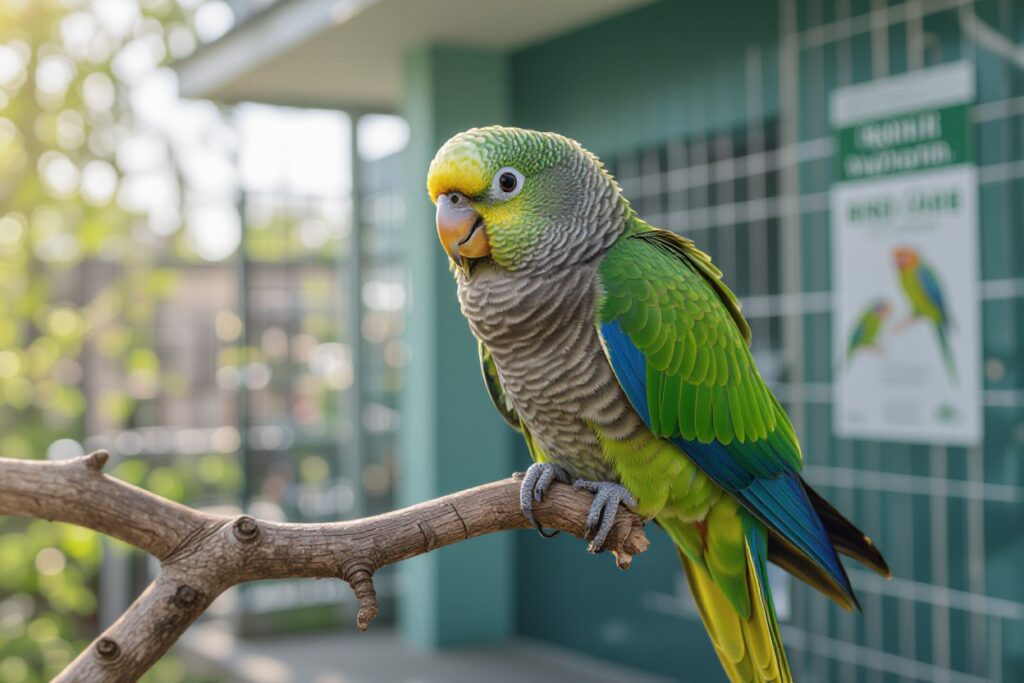Most pet bird owners underestimate the critical need for mental stimulation to ensure their feathered friends thrive. Providing enriching activities not only prevents boredom but also helps to combat behavioral issues such as feather plucking and aggression. Engaging your bird’s mind through toys, puzzles, and social interaction can lead to a happier, more well-adjusted pet. By understanding the importance of mental stimulation, you can contribute greatly to your bird’s overall welfare and longevity.
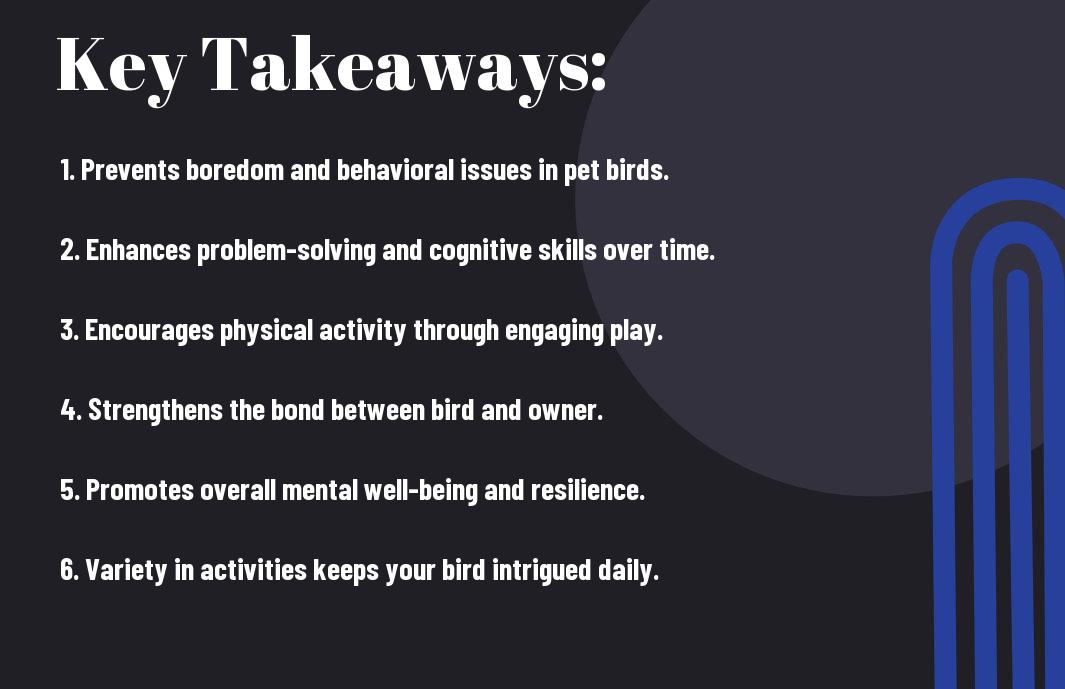
Understanding Mental Stimulation
To ensure the overall well-being of your pet bird, it is crucial for you to comprehend the concept of mental stimulation. This involves engaging your bird’s mind through various activities and experiences that challenge its cognitive abilities and encourage natural behaviors. Just as you would stimulate your brain with puzzles or reading, your feathered friend requires similar mental exercises to thrive. Without appropriate stimulation, birds can become bored, stress-prone, and even develop behavioral issues, which can be detrimental to their health and happiness.
What is Mental Stimulation?
The term mental stimulation refers to activities designed to activate your bird’s brain, prompting it to think and explore its environment. This can include problem-solving tasks, social interaction, and environmental enrichment. It is vital for you to recognize that mental stimulation goes beyond mere toys; it involves creating a variety of opportunities for your bird to use its intelligence and curiosity. By understanding your pet bird’s natural instincts and behaviors, you can provide a stimulating environment that keeps its mind sharp.
Benefits of Mental Stimulation for Pet Birds
For your pet bird, mental stimulation is not just a luxury but a necessity. Engaging its mind can lead to a host of benefits, such as reduced stress and anxiety, improved social behaviors, and enhanced problem-solving skills. Birds that receive adequate mental exercise are often more content, less prone to destructive behaviors, and exhibit healthier physical and emotional states. Moreover, promoting mental stimulation is fundamental to preventing boredom and the associated detrimental effects it can have on your pet’s overall well-being.
This importance of mental stimulation extends beyond mere entertainment. It can significantly contribute to your bird’s ability to engage in social interactions, avoid depression, and improve their level of trust toward you and other members of your household. By investing time in creating a mentally engaging environment, you are also fostering a strong bond with your bird, resulting in a happier, more balanced pet. Always remember that a mentally stimulated bird is a healthy bird, so prioritize these activities in your pet care routine.
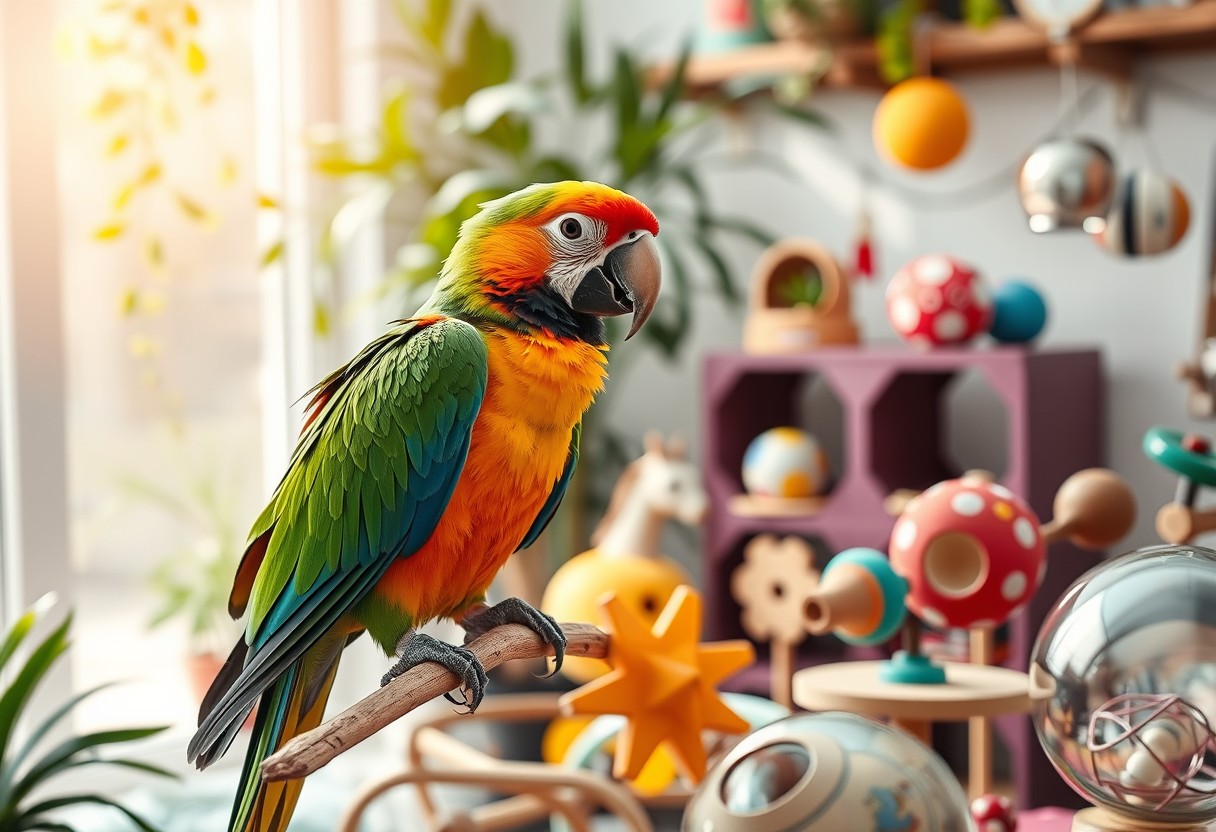
Types of Mental Stimulation
Little do many bird owners realize that stimulating your pet bird’s mind is just as important as providing them with a balanced diet. Providing various forms of mental stimulation not only allows your feathered friend to thrive but also enhances their overall well-being.
| Toys and Puzzles | Engages your bird’s problem-solving skills and keeps them entertained. |
| Social Interaction | Strengthens your bond and provides emotional support to your bird. |
| Training and Tricks | Enhances your bird’s cognitive abilities while creating a fun experience. |
| Environmental Enrichment | Encourages natural behaviors and creates a stimulating habitat. |
| Variety and Change | Prevents boredom and maintains ongoing interest in activities. |
Toys and Puzzles
Toys are important for your bird’s mental health. They provide an opportunity for physical activity while challenging your bird’s chops and natural instincts. Variety is key here—different shapes, colors, and functions can stimulate your bird’s curiosity and suspicious nature. Puzzles that require your bird to work for treats are particularly effective, as they tap into their natural foraging instincts, which can be strong for many species.
When choosing toys, make sure they are safe and constructed with materials that won’t harm your bird. Look for items made from non-toxic materials, and be cautious of small parts that can pose a choking hazard. Regularly rotating the toys can help maintain your pet’s interest and encourage continual engagement.
Social Interaction
Interaction with you is another critical form of mental stimulation for your pet bird. Regular social engagement not only bonds you with your bird but also allows them to express their natural behaviors. Birds are inherently social creatures, and frequent interaction can help reduce anxiety and loneliness.
In addition to physical play, talking and singing to your bird can stimulate their mental faculties. Many species enjoy mimicking human sounds and will thrive on this social interaction, which helps them feel more connected. Your enthusiasm and attention will go a long way in making your bird feel secure and valued.
Another way to encourage social interaction is to welcome other gentle pets into the environment, provided they get along with your bird. Making a safe space where your bird can observe or interact with other friendly creatures can enhance their social skills.
Training and Tricks
Puzzles are not the only way to keep your bird mentally stimulated. Training your bird to perform tricks can be an incredibly rewarding experience for both of you. Birds are intelligent animals capable of learning various commands and behaviors. Engaging them with a structured training routine not only challenges their brain but also reinforces your bond.
Through positive reinforcement, you can teach your bird simple tricks like “step-up” or “spin,” which encourage problem-solving and cognitive engagement. Always remain patient and use treats as motivation, making the learning experience positive and enjoyable for your bird.
With consistent practice, you can build a strong foundation of trust and communication that enhances both their confidence and your mutual relationship. It’s important to remember that training sessions should be brief but frequent to maintain their interest.
Environmental Enrichment
With the right environmental enrichment, you can transform your bird’s living space into a stimulating habitat. This involves providing varied perches, feeding strategies, and interactive elements that mimic their natural surroundings. The goal is to create an environment where your bird can explore, discover, and engage with their surroundings.
Changing up the arrangement of their space or introducing new items regularly can prevent boredom and keep your bird mentally agile. Using materials like safe plants or interesting cuttlefish can stimulate your bird’s exploratory instincts as well.
Enrichment is crucial in echoing the complexities of your bird’s natural habitat, allowing them room to be curious and active. Always monitor their interactions with new elements to ensure safety while maximizing their overall happiness.
Perceiving the significance of these varied stimulations will help enhance your pet bird’s quality of life and keep their engaging personalities vibrant and healthy.
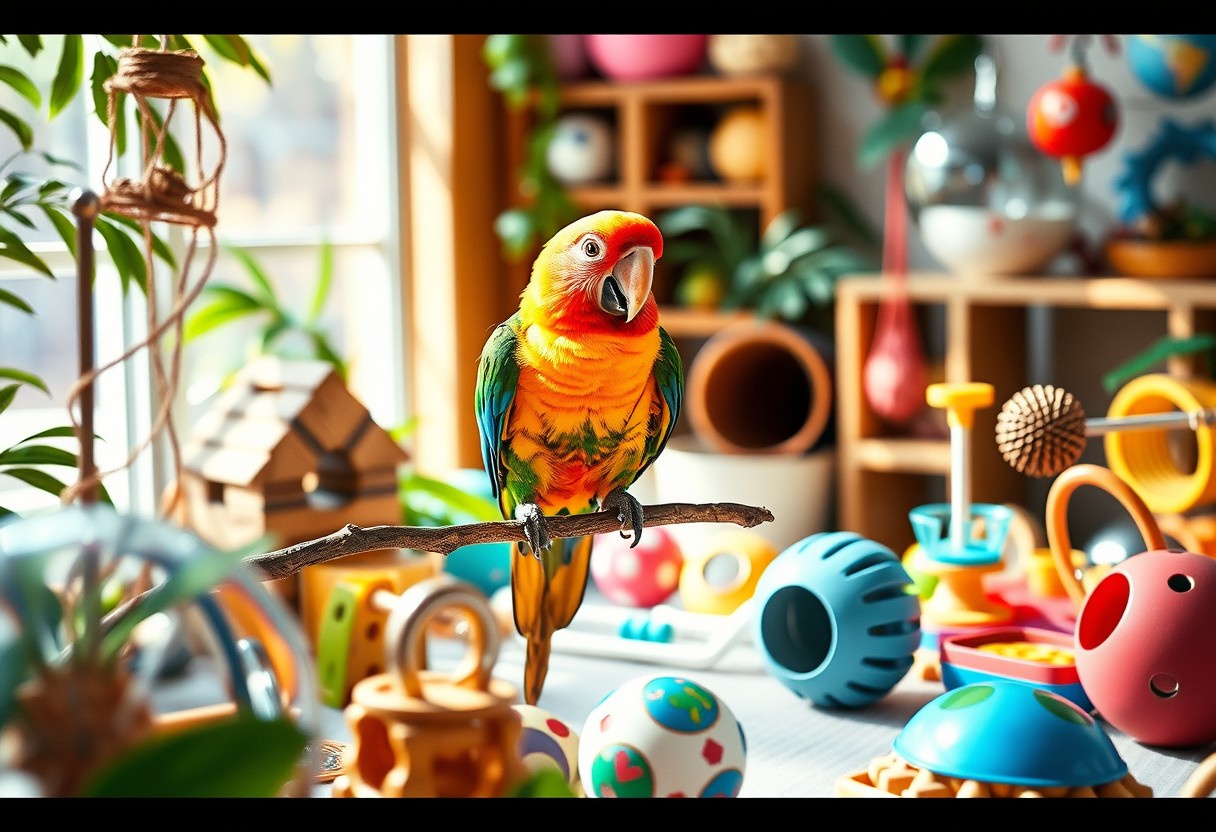
Signs of Boredom in Pet Birds
Your pet bird is a creature of intellect and curiosity, and like any intelligent being, they require mental stimulation to thrive. Recognizing the signs of boredom in your feathered friend is crucial for maintaining their well-being. Understanding these signs allows you to implement timely interventions, enhancing your bird’s quality of life. In this chapter, we will explore both behavioral and physical indicators of boredom in pet birds, helping you become more attuned to their emotional and psychological needs.
Behavioral Indicators
Signs of boredom in pet birds can manifest through various behavioral changes. One prominent indicator is excessive vocalization—if your normally chatty bird suddenly becomes quiet, or conversely, if they start squawking incessantly, it may be a sign that they are feeling under-stimulated. Additionally, repetitive behaviors, such as feather plucking or pacing along the cage bars, can develop as your bird seeks ways to alleviate their boredom. You might also observe them losing interest in their usual activities, such as playtime or interacting with toys. These behaviors can significantly affect their mental health, illustrating the importance of keeping your bird engaged.
Physical Signs
Physical signs of boredom in your pet bird can be just as telling as behavioral changes. When birds are bored, they may exhibit changes in their grooming habits. A lack of interest in preening can lead to unkempt feathers, while excessive grooming might indicate stress or anxiety caused by boredom. Furthermore, you might notice that your bird has become less active, spending most of the day sitting idle rather than exploring their environment or engaging in play. These shifts in physical behavior are crucial indicators that your bird’s mental needs are not being met.
With that said, it is vital to pay attention to these physical signs, as they can lead to more severe health issues if ignored. Birds that are bored may lose weight due to decreased activity or inadequate self-care, and they may even become more susceptible to illness and behavioral disorders. By addressing these concerns promptly, you can foster a happier, healthier environment for your pet bird, ensuring they remain vibrant and engaged in their daily lives.
Strategies to Enhance Mental Stimulation
Many pet bird owners underestimate the importance of mental stimulation for their feathered companions. Providing engaging activities can significantly improve your bird’s mood, behavior, and overall health. To ensure your bird remains engaged and mentally active, implementing a variety of strategies is crucial. Here are some effective methods that can help boost your pet’s cognitive abilities.
Daily Activity Routines
An crucial aspect of enhancing your bird’s mental stimulation involves establishing a consistent daily schedule. This routine can include various activities such as playtime, social interaction, and exercise. Scheduling designated times for these activities not only adds structure to your bird’s day but also provides predictability, which is comforting for many birds. You should aim to spend quality time with your bird each day, ensuring they receive the attention they deserve.
Additionally, consider incorporating training sessions into your daily activities. Teaching your bird new tricks or reinforcing good behaviors through positive reinforcement not only stimulates their mind but also strengthens your bond. Use favorite treats as rewards and keep each session short and engaging to maintain their interest. Note, the goal is to make learning a fun experience for your pet!
DIY Enrichment Ideas
Ideas for creating DIY enrichment activities are virtually endless, allowing you to customize the experience specifically for your bird’s preferences and needs. You can start with simple projects such as crafting foraging toys from household items. For example, use paper towel rolls and fill them with your bird’s favorite treats. This encourages your pet to explore, use their beak, and engage in natural foraging behavior.
Another fun idea includes creating obstacle courses using household objects like cushions, boxes, or even perches. The challenge of navigating through the course will keep your bird mentally stimulated while also providing a form of physical exercise. Note, the more varied and interesting you make the activities, the more likely your bird will engage with them!
Activity and routine variation are key to holding your bird’s interest. Regularly introduce new obstacles, toys, and training challenges to ensure your pet does not become bored with the same activities. Making these adjustments will not only keep their minds sharp but also promote an overall sense of well-being.
Incorporating Variety
The importance of incorporating variety in your bird’s daily activities cannot be overstated. If your pet bird is consistently exposed to the same environment and stimuli, they are likely to become bored and disinterested. To combat this, mix up their toys, rearrange their living space, and periodically introduce new activities to keep their routine fresh and engaging.
Moreover, bringing in new sounds, smells, and visuals can also spark curiosity and encourage exploration. For example, you could play different types of music or nature sounds, or even introduce safe, bird-friendly plants to their environment. The constant influx of new experiences will aid in maintaining their mental sharpness.
Strategies for fostering mental stimulation should be dynamic and adaptable as your bird’s interests may change over time. Pay attention to what captures their attention and adjust your enrichment activities accordingly. This will help ensure your bird remains engaged and happy, contributing to a balanced and fulfilling life.
Summing up
From above, it’s clear that providing mental stimulation for your pet bird is crucial for their overall well-being. Birds are intelligent creatures that thrive on interaction, challenges, and engaging activities. By incorporating various forms of enrichment into their daily routine, such as toys, puzzles, and social interactions, you can prevent boredom and promote healthy behaviors. Recall, a mentally stimulated bird is a happy bird, exhibiting less stress and behavioral issues, leading to a longer and more fulfilling life.
Additionally, you must understand that your engagement is key to fostering a stimulating environment. Spending quality time with your bird and introducing new activities not only satisfies their mental needs but also strengthens your bond. The effort you invest in enriching your pet’s life is invaluable and can manifest in their happiness and overall health. So, be proactive and creative in your approach to your bird’s mental stimulation, ensuring that they lead a vibrant and enriched life.
FAQ
Q: Why is mental stimulation important for pet birds?
A: Mental stimulation is crucial for pet birds as it helps prevent boredom, which can lead to stress and behavioral problems. Birds, being intelligent creatures, need challenges that engage their minds and encourage natural behaviors such as foraging, problem-solving, and social interaction. Providing stimulating activities can enhance their quality of life, improve their mood, and strengthen the bond between the bird and its owner.
Q: What are some effective ways to provide mental stimulation for my pet bird?
A: There are various effective methods to ensure your pet bird receives adequate mental stimulation. You can offer a variety of toys that require manipulation, such as puzzles, foraging devices, and climbing structures. Rotate toys regularly to keep their environment engaging. Additionally, incorporating training sessions using positive reinforcement not only stimulates their mind but also fosters good behavior. Social interaction, whether with humans or other birds, is necessary, so consider supervised playdates or flying time outside of their cage.
Q: How can I tell if my bird is getting enough mental stimulation?
A: Signs that your bird is receiving adequate mental stimulation include active and curious behavior, vocalization, and engagement with toys and activities. Conversely, if you notice excessive screaming, feather plucking, aggression, or lethargy, it may indicate that your bird is bored or stressed. Monitoring their behavior and regularly changing their environment can help ensure they remain mentally stimulated and emotionally fulfilled.
